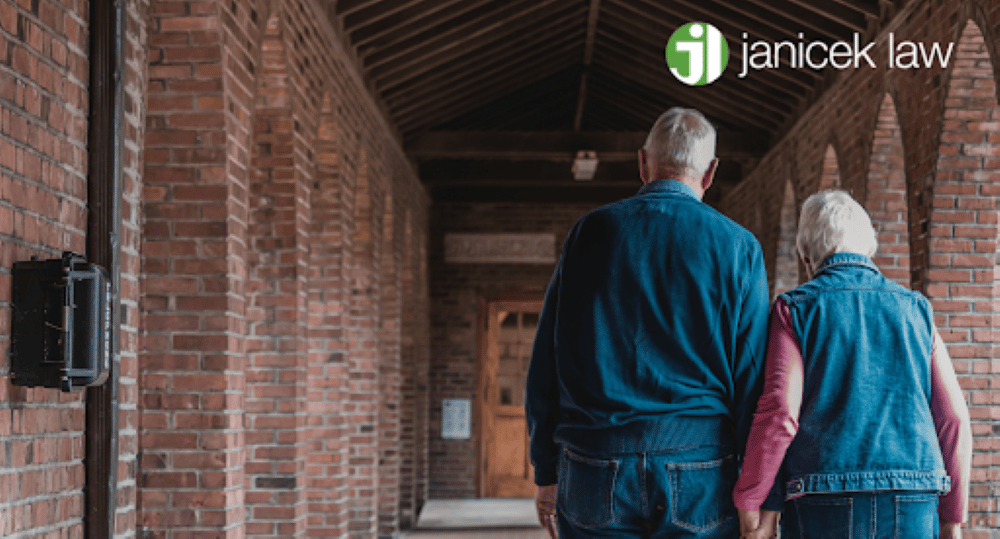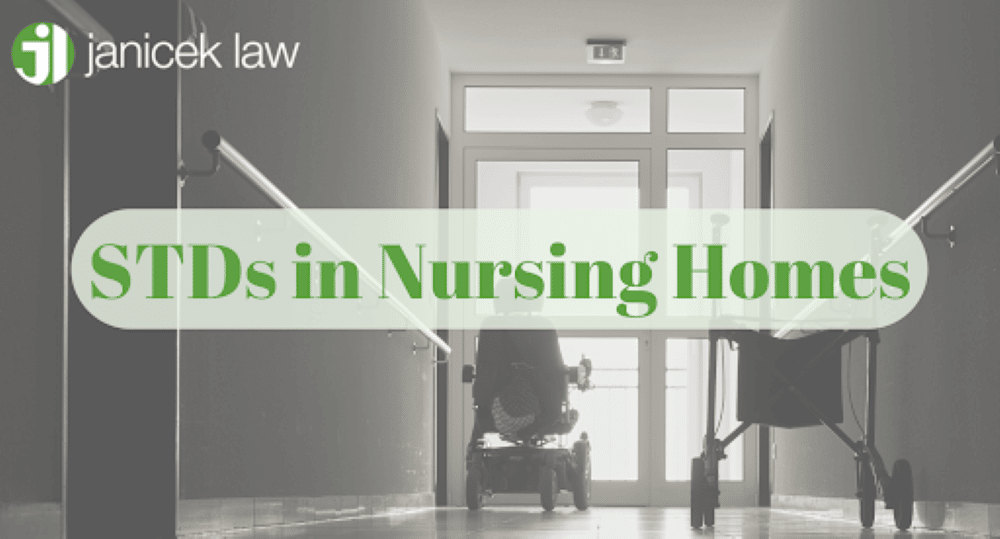When you think about nursing homes, you may not immediately think of sexually transmitted diseases. Unfortunately, STDs in nursing homes are becoming a significant problem. More and more elderly adults are sexually active. With the rise of erectile dysfunction drugs and hormone therapy for post-menopausal women, common sexual issues are easily solved. Sexually transmitted diseases can also be the result of sinister activities in a nursing home. Sexual abuse is often underreported in nursing and retirement homes. Vulnerable victims may not be able to report what happened to them.
If you believe a member of your family is being abused in a nursing home, contact the experienced attorneys at Janicek Law. Our San Antonio nursing home abuse and neglect attorneys have been fighting for the rights of the injured elderly people for over 25 years. We can support you through this challenging time. We’ll outline some signs to look for and more information that you can share with elderly family members.
How Residents Can Contract Sexually Transmitted Diseases in Nursing Homes
Most people aren’t aware that their older adult relatives still have an active sex life. The New England Journal of Medicine surveyed older adults about sexual activity. 73% of adults between the ages of 57-64 reported that they were still sexually active. 53% of those aged 65-74 and 26% of those aged 75-85 were also still active.
Sexually transmitted diseases can spread during unsafe sexual activity. Older adults have an increased risk of contracting STDS. Lack of knowledge and education, health problems, and increased availability of drugs for sexual issues are all reasons for this.
Many seniors have compromised immune systems. They have an easier time contracting illnesses, including sexually transmitted diseases. Post-menopausal women don’t have to worry about pregnancy, so many don’t practice safe sex or use condoms. Many older adults were already married by the time safe sex education became popular, so older people may not know safe sex etiquette.
Older men in skilled nursing facilities can get prescriptions for erectile dysfunction drugs. Post-menopausal women can get hormone treatment to treat low libido and vaginal dryness. Health care providers don’t ask about sexual activity among seniors the same way they would among younger adults. Healthcare providers also aren’t likely to test seniors for STDs. This means seniors can go without treatment and continue spreading the disease.
STDs among nursing home residents can also be due to sexual abuse. Sexual abuse in nursing homes can be committed by staff, other residents, and even visitors to the nursing home. When nursing homes fail to do thorough background checks, they can hire staff members with a history of abuse and neglect. Understaffed nursing homes can leave residents unsupervised with each other and outside visitors. Poor security can mean that anyone, including criminals, can get into the nursing home.
How Common are STDs in the Elderly?
STD rates among older adults have increased over the past few years. Between 2010 and 2014, gonorrhea cases among adults over 65 increased by more than 90% according to a recent study. Syphilis and chlamydia infections each increased by 65% and 52%. The older population also uses condoms less than any other age group. Young people use condoms for both disease control and pregnancy prevention. The older population mainly used them for only contraception when they were young. Venereal diseases weren’t common among the general population in their youth, so many don’t think to use condoms with sexual partners in later life. With longer lifespans and divorce more popular, older people date more often and may not know the sexual history of a new partner.
Talk to Your Loved One About Sexual Health and Sexual Abuse
Sexual health is important at all ages. Most people like to believe that their older relatives stop having sex after a certain age, but research proves otherwise. It may be embarrassing to have “the talk” with your parents or grandparents, but this information is important. Having a conversation about safe sex etiquette and condom use can be life-saving. Condoms can prevent the transmission of the human immunodeficiency virus (HIV). While HIV is no longer the death sentence it used to be, treatment is necessary. Since many doctors don’t ask seniors about their sexual activity, they are less likely to test for life-threatening STDs like HIV. This can mean that your relative doesn’t get the life-saving treatment necessary. It also means they can continue spreading that disease in their care facility.
Talking to your older family members about sexual abuse can also mean that they know what to look out for. Informed seniors may be more likely to speak up about abuse if it happens to them.

Types of STDs that Can Spread Amongst Older Sexually Active Adults
Gonorrhea, syphilis, and chlamydia infections are the major STDs currently spiking among older populations. These are not the only diseases that can spread in nursing homes. Three types of STDs can spread among seniors: bacterial, viral, and parasitic STDs. Hepatitis is a viral sexually transmitted disease that can destroy the liver. Gonorrhea and chlamydia are both bacterial STDs that can be treated with medication. Sex education can prevent the spread of disease among older adults. Having a conversation can prevent many of the risks involved with the sexual health of seniors.
Sexually Transmitted Infections and Other Signs of Sexual Abuse
Older adults contracting STIs in a care facility should be a major warning flag that something is wrong. This is even more true for older adults with cognitive decline. Female and male residents can contract sexually transmitted diseases from consensual sex. These diseases can also be the result of abuse. Women and patients with cognitive issues are the most vulnerable to abuse. They may not know what’s happening to them, or they may be manipulated into thinking that the abuse never happened.
The most common warning sign of sexual abuse in seniors is bruising around the intimate areas of their body, such as breasts and genitals. Clothing hides many of these physical signs, but there are behavioral changes with sexual abuse as well. Sudden depression, lack of appetite, crying, and hostility are all signs of abuse to look out for. Educating your elderly family members about what abuse is can help them.
Can Memory Care Patients Consent?
Many senior living communities have rules about fraternization between the residents. Some have adopted policies that allow sex between consenting residents. No matter which kind of policy they have, senior care centers have a duty to protect seniors from sexual abuse and prevent the spread of sexually transmitted diseases. Seniors with memory issues like dementia and Alzheimer’s may not even understand the concept of consent.
In Texas, children under 17 cannot legally consent to sexual relations. A person has to have the mental capacity to consent to sexual activity. That poses the question of whether memory care patients can legally give consent to sexual activity. A person does not lose their ability to consent to sex as soon as they receive a diagnosis of a form of dementia. A dementia diagnosis does, however, make them more vulnerable to sexual abuse.
Many factors go into consent for seniors with a form of dementia. The age of the relationship, recognition, interest, and the ability to say “no” at any point are all elements to consider. If the relationship is new and one or both patients are non-verbal, consent can be difficult to determine. If you have any suspicion that an elderly family member is being abused, seek immediate action. File a report with the nursing home and gather as much evidence as possible. Contact an experienced San Antonio nursing home abuse attorney at Janicek Law.
San Antonio Nursing Home Sexual Abuse Lawyer
If you have an elderly loved one that has contracted an STD while in a senior living facility, get all the facts you can. Many seniors are vulnerable to abuse due to diminished health or mental capacity. Perpetrators of abuse may convince your loved one that they imagined the abuse or that they consented to it. Nursing homes and long-term care facilities may even lie about the injuries to protect themselves and their employees. The San Antonio personal injury lawyers at Janicek Law have been fighting for the rights of the injured for more than 25 years. Contact us today at 210-366-4949 to set up a free consultation. We will help you find the negligent parties and hold them accountable for their abuse.

